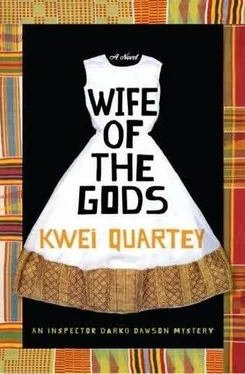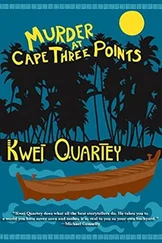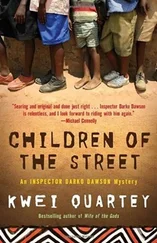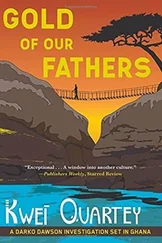He suddenly grinned at his own verbiage, showing a set of yellowed horse teeth, and Dawson couldn’t help smiling himself.
“Before arresting Samuel,” he said, “can we go to the scene of the crime?”
T IMOTHY SOWAH LIVED INHo, and he had to get back. Dawson walked him to his car, a sleek, silver Audi 80. Timothy opened the trunk and pulled out a bag containing two bottles of liquor. Dawson took a peek. One was Beefeater London dry gin and the other was German schnapps.
“Good heavens,” Dawson said. “Look at the size of these things.”
Timothy affected a rueful look. “Standard gifts to take to a fetish priest. Besides, I want to make sure Togbe’s tongue gets loosened.”
“Thank you,” Dawson said. “Very thoughtful.”
They exchanged calling cards.
“I’ll put my personal mobile number on the back,” Timothy said. “Just in case you need me.”
“Left-handed, I see,” Dawson commented as Timothy wrote it down.
“Yes,” Timothy said. “Is that of particular interest?”
“Yes. My mother was left-handed, and my brother is ambidextrous, so I tend to like lefties.”
“Oh, thank you,” Timothy said, looking pleased. “I certainly hope we’ll meet up again soon in less unpleasant circumstances, Detective Inspector. Best of luck.”
“Thanks, Mr. Sowah.”
“Oh, please-do call me Timothy.”
Dawson and Inspector Fiti set out into the forest. The midafternoon sun had fled from a mob of black clouds building up in the northeast corner of the sky.
“We have to be quick,” Fiti said. “The rain is coming.”
They picked up the pace. Dawson caught sight of a compound in a grove of trees in the distance to his right, and immediately his recollection of it swept in. Isaac Kutu’s place . He remembered it clearly, and Isaac as well. Deep, dark, flashing eyes with secrets in them.
“Does Isaac Kutu still live there?” Dawson asked, pointing with his chin.
“Yes. Do you know him?”
“I met him at my auntie’s house the time I visited with my mother.”
“We can go and see him tomorrow if you like,” Fiti said. “He knew Gladys Mensah very well.”
They turned left off the Ketanu-Bedome footpath into the forest. What resembled a trail soon disappeared, and as the sky darkened, the vegetation thickened around them and slowed their progress. Now Dawson remembered the same padded and insulated quality of the forest that he had experienced when here as a boy. Sound was quickly muffled by the trees and undergrowth. Every footfall, every scrunch of dead leaves or crack of a branch had a kind of nearness isolated by the cocoon of the forest’s stillness.
After several minutes of tramping along, Fiti stopped, put his hands on his hips, and looked around. “I think I’m lost.”
He turned one revolution, getting more confused. “Which way did we come?”
“That way,” Dawson said, pointing with his chin. “Southwest headed northeast.”
If he had been blessed with one attribute, it was the ability to tell direction with compass precision, which few Ghanaians concerned themselves about. Fiti frowned at him as if he had spoken Greek.
“Let’s go back,” he said.
This time Dawson took the lead.
“Ah, here! ” Fiti suddenly exclaimed. “This way-I remember now.”
He made a direction change-due west, Dawson noted.
After another few minutes, Fiti said, “Yes, it was near here.”
They went a little farther, and then Fiti stopped. “This is the place. She was lying just past this palm tree under that bush.”
Dawson stooped down. “In what direction?” He had studied the photographs but wanted to be sure he had his bearings.
Fiti made a forward and back gesture. “Like that.”
“And the shoe that was missing-where was that?”
“Over there.” Fiti pointed a few feet away. “And then the briefcase she was carrying was farther up. It had a mobile inside, but the crime scene people say the rain completely spoiled it, so they have to see if they can get it to work again.”
Dawson nodded. All Gladys’s items found at the scene were now at the crime lab in Accra.
“You didn’t notice any footprints around?” he asked.
Fiti shook his head. “No.”
Dawson looked around. “A lot of banana trees,” he commented as he stood up.
“These are plantain,” Fiti corrected.
“Ah.” Dawson went closer and saw fat green bunches of the fruit hanging. “Yes, I see.”
Fiti was amused. “City man doesn’t know how plantain tree look.”
Dawson smiled absently. He took a few additional steps, searching some more.
“What are you looking for?” Fiti asked him.
“Nothing in particular.”
Dawson penetrated some way into the plantain cluster and kept going without knowing why. At length, he found something curious: a collection of fifteen or so rounded rocks piled on top of one another to form a pyramid about two feet in height. Dawson knelt down in front of it.
“What is this?” he called out to the inspector.
Fiti came up behind him and stared at the pyramid for a moment. “Maybe some kind of juju to chase away evil spirits or witchcraft.”
“Why here?” Dawson said. “Spirits like to be around plantain trees?”
“They can be anywhere, Inspector Dawson,” Fiti said charitably. “People put juju near their farms so their farming won’t be spoiled, understand?”
Dawson reached for the top rock of the pyramid, but Fiti deflected his hand.
“No! Inspector Dawson, I’m sorry, but you don’t touch something like that, sir. Something could happen.”
“Happen like what?”
Fiti sighed and shook his head. “Please, I’m just telling you for your own good-don’t touch it.”
Dawson shrugged. “All right. Where would someone get those rocks?”
“There is a stream not far away that has some like that.”
The forest had grown dark, and the sky was black. Lightning, flittering from one horizon to the other, lit up the juju pyramid, and a rumble of weighty thunder lumbered through.
“We have to go now,” Fiti said. “The rain won’t wait anymore.”
It began to pour before Fiti and Dawson made it back to the police station, and they were soaked enough to need a change of clothes. Dawson grabbed a shirt and pants from his bag and changed in Inspector Fiti’s office.
They talked about the case, and Fiti told him about the Mensahs. It was obvious how much admiration he had for them. They were relatively successful people who ran several different enterprises, and their talent was clear: Kofi, the patriarch, and his wife traded in cocoa, palm oil, and cassava. Charles, the oldest son, helped with the farm as well, but he was also a carpenter who could put up anything a hundred times faster than any government-sponsored project. Kofi’s sister, Elizabeth, was a seamstress and cloth trader, and of course, Gladys, the star, had been a medical student. Her becoming a doctor would have been the pinnacle of the family’s successes.
In contrast, Fiti had nothing but distaste for the Boatengs, particularly Samuel, whom he accused of petty theft in the recent past. Fiti was determined to arrest him, and he wanted to do it before dark. It was now going on five in the afternoon.
“The rain is stopping,” he said, rising from his chair. “We can go now.”
Dawson took Gyamfi in his car, and they followed Fiti and Constable Bubo in the official police vehicle. It was impossible to drive right up to the Boatengs’ house. A gutter ran directly across their path, and the rain had swelled it with mud. They parked the cars just in front of the gutter, jumped over it, and walked the rest of the way. It was barely drizzling now, but there were huge puddles and broad patches of sticky mud in their path.
Читать дальше












